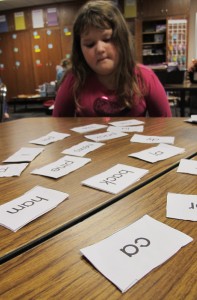State Releases Third Grade Reading Exam Results — Five Things To Know

Kyle Stokes / StateImpact Indiana
A Bloomington third grader takes part in a reading lesson about syllables.
More than 84 percent of Indiana third graders passed a high-stakes test of their reading skills in March, according to data state education officials released today.
But more than 11,700 third graders did not pass the IREAD-3 exam, putting many of them at risk of being held back from fourth grade if they cannot pass a retake of the test this summer.
We’ve posted complete statewide results of the exam to two easily-searchable tables. You can find results for your school or your district.
“We know students who do not have these skills by the end of grade 3 rarely catch up to their peers,” state superintendent Tony Bennett said in a statement releasing the results.
“The IREAD-3 assessment,” the statement continued, “helps educators and parents ensure all children receive the support they need before moving forward with more challenging reading instruction.”
Here are five things to know about the results:

Kyle Stokes / StateImpact Indiana
State superintendent Tony Bennett announces results of Indiana's IREAD-3 exam in his office at the statehouse Tuesday morning.
—Tony Bennett, state superintendent
- Socio-economic factors can (but don’t always) lower scores. Schools with a higher percentage of students receiving free or reduced price lunches — a common indicator for a school’s level of poverty — are more likely to have a lower percentage of students passing the IREAD-3. (It’s a familiar trend.) But there are several exceptions to the rule. Among them: Ernie Pyle Elementary in Indianapolis, where nearly all of the students receive free or reduced price lunches. 95 percent of the school’s third graders passed.
- Charter schools, on average, had lower passage rates than the rest of the state: 71 percent of students in 47 charter schools passed the exam. 84 percent of all Indiana students passed the test.
- Nobody’s been held back yet. Schools have already informed many of the families of third graders who did not pass of their student’s IREAD-3 results. For some, the intensive remediation work has already begun and will continue into the summer months. Students can retake the exam in June. It’s only after that exam that we’ll know how many students are at serious risk for being retained.
- The key words to learn now: “good cause exemption.” Though the Indiana Department of Education’s new reading policy says any third grader who cannot pass the IREAD-3 cannot go on to fourth grade, state officials say there are — and will be — exceptions to the rule. Students with “disabilities” or English Language Learners are eligible for “good cause exemptions” from the policy. State officials say those exemptions are broad enough that districts can determine which students truly need retention. That message, however, hasn’t necessarily gotten through to parents. While some district officials have told StateImpact they will do everything they can to give exemptions to every student they can, some parents of students who did not pass say their schools feel the state has tied their hands. But how many exceptions to the rule will there be? We’ll have to wait until the end of summer to see.
- Florida has been here, done that. Indiana’s third grade reading and retention plan is modeled on a similar policy that’s been on the books in Florida for a decade. In the first year Florida education officials retained students for poor scores, 23 percent of students did not pass necessary testing. Roughly 15 percent of those students were ultimately held back.

